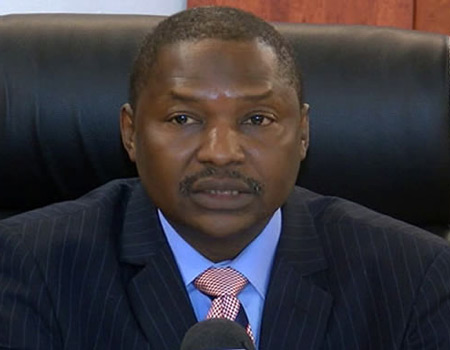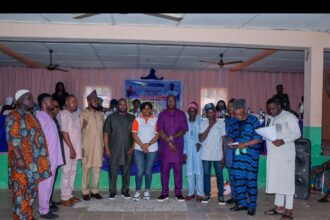The Federal Government is set to take one hundred million Nigerians out of abject poverty by giving out macro loans to boost small scale business activities, the Attorney-General of the Federation (AGF) and Minister of Justice, Abubakar Malami (SAN) has said.
The AGF made the declaration in Argungu while speaking at the distribution of microloans to 1,500 women and youths in Kebbi State organized by the National Directorate of Employment (NDE).
The Special Assistant on Media and Public Relations to the AGF, Dr Umar Gwandu said in a statement on Tuesday said that achieving economically productive, socially responsible and culturally viable womenfolk requires systematic and consistent efforts,
Malami said the Federal Government has consciously and deliberately come out with a number of schemes to generate employment and enhance the productivity of Nigerians.
In addition to facilitating job creation through the establishment of new ministries, departments and agencies, Malami said the Federal Government is committed to massive employment of teaming Nigerian populace in various Ministries, Departments and Agencies including security and paramilitary sectors.
While congratulating the beneficiaries of the scheme, Malami called on them to make judicious use of the funds provided.
Meanwhile, the Minister has said that the erroneous assertion by Mr Femi Falana (SAN) on the process of disbursement and use of recovered stolen funds based on the provisions of the Revenue Mobilization, Allocation and Fiscal Commission Act and Section 153 (1) (n) of the Constitution of the Federal Republic of Nigeria 1999, as amended, depicts a rash analysis devoid of clear legal foundations.
A statement from the office of the AGF said the Revenue Mobilization, Allocation and Fiscal Commission Act has nothing specific on funds recovered from indicted public officers or assets recovered internationally.
“It merely mentions accruals and disbursement of revenue from the Federation Account. So, questions of recovery of stolen funds from indicted public officers and illicit assets recovered internally are not contemplated by the spirit of the law internationally and are appropriately dealt with by other relevant laws.
“One cannot impute into legislation what is not specifically and expressly mentioned. It is, therefore, misleading to give the impression that recoveries and usage of stolen funds stashed abroad are provided for by the Revenue Mobilization, Allocation and Fiscal Commission Act. More so when recoveries are product of by multiple jurisdictional legislations, thereby bringing recoveries into the purview of conflict of laws”, the minister stated.
Malami stated that, one cannot situate rights and entitlements on looted funds and recovered assets with myopic and narrow understating of concepts of the application of local legislation.
“For the avoidance of doubt and the purpose of setting the records straight, the application of the looted funds can only factor within the context of mutual understanding and negotiations of international and multifaceted jurisdictional and territorial legislative issues.
“Section 6 of the Revenue Mobilization, Allocation and Fiscal Commission Act has in part clearly outlines the powers of the Commission. In particular, sub-section (1) (a) empowers the Commission to monitor the accruals to and the disbursement of revenue from the Federation Account.
“This purely targets revenue already in the federation account or funds accruing from sources designated by the Constitution. This derivation formula is local and applies locally within Nigeria. This is not the case with the recovery of stolen funds”, he said.
The recovery of stolen assets and the subsequent uses to which the funds may be employed, the minister said, are subject to international agreements between Nigeria and the affected countries, adding that the repatriated funds are based on cooperation and mutual assistance agreements, especially the United Nation Convention against Corruption and Implementation of the Global Forum on AssetRecovery (GFAR) Principles on the Repatriation of Stolen Assets.
The minister said the disbursement formula mentioned by Falana is applicable in relation to monies belonging to the Federal Government that are locally generated and should not to be confused with stolen funds and assets domiciled in foreign jurisdictions whose recovery and subsequent repatriation are based on international legal arrangements between the Federal Republic of Nigeria and the foreign custodians of the funds.








